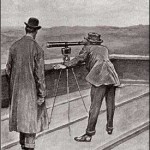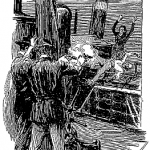During all this time Kate had been entirely unconscious of her companion’s intentions and designs. She had been associated with Ezra for so many years, and had met such undeviated want of courtesy from him, that the idea of his presenting himself as a suitor never came into her head. She hailed his charge of demeanour, therefore, as being the result of his larger experience of the world, and often wondered how it was that he had profited so much by his short stay at the Cape. In the cheerless house it was pleasant to have at least one companion who seemed to have kindly feelings towards her. She was only too glad, therefore, to encourage his advances, and to thank him with sweet smiles and eloquent eyes for what appeared to her to be his disinterested kindness.
After a while, however, Ezra’s attentions became so marked that it was impossible for her to misunderstand them any longer. Not only did he neglect his usual work in order to hang round her from morning to night, but he paid her many clumsy compliments and gave other similar indications of the state of his affections. As soon as this astounding fact had been fairly realized by the girl, she at once changed her manner and became formal and distant. Ezra, nothing daunted, redoubled his tender words and glances, and once would have kissed her hand had she not rapidly withdrawn it. On this Kate shut herself up in her room, and rarely came out save when the other was away in the City. She was determined that there should be no possibility of any misunderstanding as to her feelings in the matter.
John Girdlestone had been watching these little skirmishes closely and with keen interest. When Kate took to immuring herself in her room he felt that it was time for him to interfere.
“You must go about a little more, and have more fresh air,” he said to her one day, when they were alone after breakfast. “You will lose your roses if you don’t.”
“I am sure I don’t care whether I lose them or not,” answered his ward listlessly.
“You may not, but there are others who do,” remarked the merchant.
“I believe it would break Ezra’s heart.”
Kate flushed up at this sudden turn of the conversation. “I don’t see what reason your son has to care about it,” she said.
“Care about it! Are you so blind that you don’t see that he loves the very ground you walk on. He has grown quite pale and ill these last few days because he has not seen you, and he imagines that he may have offended you.”
“For goodness’ sake!” cried Kate earnestly, “persuade him to think of some one else. It will only be painful both to him and to me if he keeps on this way. It cannot possibly lead to anything.”
“And why not? Why should—”
“Oh, don’t let us argue about it,” she cried passionately. “The very idea is horrible. It won’t bear talking about.”
“But why, my dear, why? You are really too impulsive. Ezra has his faults, but what man has not? He has been a little wild in his youth, but he is settling down now into an excellent man of business. I assure you that, young as he is, there are few names more respected on ‘Change. The way in which he managed the business of the firm in Africa was wonderful. He is already a rich man, and will be richer before he dies. I cannot see any cause for this deep-rooted objection of yours. As to looks he is, you must confess, as fine a young fellow as there is in London.”
“I wish you not to speak of it or think of it again,” said Kate. “My mind is entirely made up when I say that I shall never marry any one—him least of all.”
“You will think better of it, I am sure,” her guardian said, patting her chestnut hair kindly as he stood over her. “Since your poor father handed you over to me I have guarded you and cared for you to the best of my ability. Many a sleepless night I have spent thinking of your future and endeavouring to plan it out so as to secure your happiness. I should not be likely to give you bad advice now, or urge you to take a step which would make you unhappy. Have you anything to complain of in my treatment of you?”
“You have been always very just,” Kate said with a sob.
“And this is how you repay me! You are going to break my son’s heart, and through his mine. He is my only boy, and if anything went wrong with him I tell you that it would bring my grey hairs in sorrow to the grave. You have it in your power to do this, or, on the other hand, you may make my old age a happy one by the knowledge that the lad is mated with a good woman, and has attained the object on which his whole mind and heart are set.”
“Oh, I can’t, I can’t. Do let the matter drop.”
“Think it over,” the old man said. “Look at it from every point of view. Remember that the love of an honest man is not to be lightly spurned. I am naturally anxious about it, for my future happiness, as well as his, depends upon your decision.”
John Girdlestone was fairly satisfied with this interview. It seemed to him that his ward was rather less decided in her refusal at the end of it, and that his words had had some effect upon her, which might possibly increase with reflection.
“Give her a little time now,” was his advice to his son. “I think she will come round, but she needs managing.”
“If I could get the money without taking her it would be better for me,”
Ezra said with an oath.
“And better for her too,” remarked John Girdlestone grimly.





